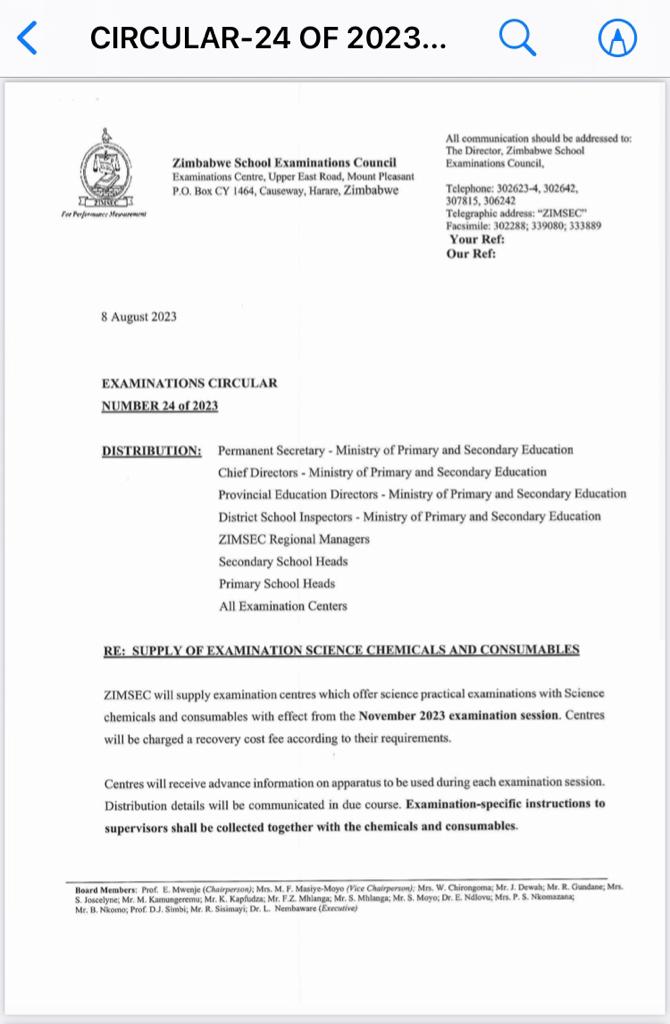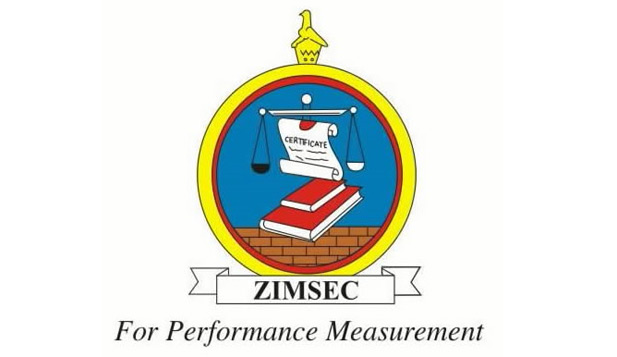The Zimbabwe School Examination Council (ZIMSEC) has announced that it will be the sole supplier of science chemicals and consumables for exams from November 2023 onwards, a move which has been met with anger from industry players, who believe that it is unfair and will put many companies out of business.
ZIMSEC published Circular 24 of 2023 saying that beginning with the November 2023 examination sessions, it will supply science chemicals and consumables to all schools.

However, the move has enraged industry players who had been supplying laboratory equipment to schools.
Stakeholders believe this move smacked of corruption, with ‘someone’ receiving a tender because the business was profitable during exam season.
They further accused the body of ‘unleashing’ this move without any consultation and wanting to compete with business, with several suppliers claiming they had already stocked up on apparatus worth thousands of US dollars hoping to sell to schools that were their largest clients.
“Someone saw an opportunity to make money from this business. But closing the private sector out is killing and destroying the economy,” said one proprietor of a laboratory equipment supplier in Bulawayo who requested anonymity.
While the profit made in supplying apparatus and chemicals varied, other stakeholders said a company could make around US$3 000 from one school.
“Mostly schools in urban areas buy a lot because they can afford and have many learners writing opposed to rural setup. So, if you have eight schools, you are assured of surviving from this exam period to June next year depending on your costs,” said stakeholders.
“My company has quite some stock coming from China and is worth US$60 000. Normally around April, we prepare for exam time and buy stock in preparation for the November exam season. If we are not supplying schools, it means every one of us who has done business with schools is effectively disenfranchised,” said one proprietor, claiming this move would result in closure of more than 150 companies at once.

However, ZIMSEC spokesperson Nicky Dlamini, said this was a measure to safeguard the examination and nothing to do with business.
“ZIMSEC is saying we’re supplying examination material, the same way in the same way it is the only one supplying questions papers. The chemicals we are supplying pertain to our examination as ZIMSEC. This is for standardisation purposes as well as to increase the security measures that come with our examination,” she said.
Dlamini said schools are still free to buy chemicals for their practical lessons but for examinations, ZIMSEC will provide.
“This is because the exams are a security exercise and there are issues to do with malpractice that we have been fighting for a very long time. I’m sure you would understand what has been happening with examinations. It has nothing to do with business and everything to do with the integrity of the examination system,” said the spokesperson.
“Stakeholders on the market who feel prejudiced are more than welcome to come to us so we can explain to them. ZIMSEC is a parastatal that is in charge of examinations. These are part of measures put in place to curb examination malpractices.”

Most laboratory and science chemical suppliers, according to the proprietor, rely on schools for business while his own company serves more than 200 schools in Bulawayo, Matabeleland North, Matabeleland South and Masvingo.
“There was no communication with stakeholders. In any case ZIMSEC wouldn’t have disclosed that since it’s basically outside the law. You don’t muzzle schools to say, ‘you’re only going to buy from us,’” he said, stressing that it was “suspicious” for ZIMSEC to issue such a demand because tenders had to be awarded by such institutions to supply a quantity of products.
“We have been supplying schools for the past five to six years. Our problem is not ZIMSEC coming into the marketplace and selling their stuff to schools but is ZIMSEC saying it is the only that will sell to schools,” he said.
“ZIMSEC is not supplying these for free so it has nothing to do with free education but making money.”
Another proprietor, Mr Masikinye, said the ZIMSEC regulations caught them by surprise.
He believes ZIMSEC should focus on providing exam question papers and allow schools to select where they buy their equipment.
“Imagine the effect this move is going to have on companies because business is going to drop. Some of us employ a large number of people and their families will suffer. We actually have to relieve them of their duties,” he said.
Masikinye stated suppliers had formed agreements in which they gave quality on credit to schools.
He also questioned whether ZIMSEC will be able to deliver high-quality supplies to schools and meet the needs of every school in the country.
“Imagine the chaos. Some of us have actually created relationships with schools. We give them extra products as appreciation and we even donate other materials such as sports kits for students and teachers,” he said.
Masikinye added that ZIMSEC’s priority should be to prevent question paper leaks, which is always a challenge during exams.
“Cambridge has the capacity to supply all these things to all who write their exams yet has not said this. There has been no problem ever since we started supplying to schools, which have been writing without any incident. Unless ZIMSEC said we were not meeting the demand or supplying substandard teams, we could understand. But what is their reason for wanting to supply?” he asked.
“That would be acceptable unless there are sensitive materials, such as slides, where ZIMSEC does not want a leak. Will ZIMSEC be able to meet the demand of every school in the country, knowing ZIMSEC and our country?”
Masikiye echoed that this legislation was more concerned with profit.
“Exam time is when most companies benefit because schools don’t buy much during the year and buy in bulk for exams. Someone wants to make money because shutting us out is not a fair deal,” he said, speculating that perhaps ZIMSEC had forged a partnership with a foreign company.
“We have been given goods on credit, which we pass on to our schools, telling them they can pay when they collect their school fees. This benefited both suppliers and the schools. What will happen to our relationships, including those companies buying equipment from outside?”
Other players suspected that perhaps ZIMSEC had clinched a deal somewhere and sought to reap benefits.
“Where has ZIMSEC suddenly found money to source and supply the whole country with apparatus and chemicals? The move only benefits a few individuals up there. We don’t know how to solve this and don’t even know who to report. Whenever you try something, you are told of statutory what what,” said one business player.
“In this economy, only a few industries are functioning, and schools are covering that gap. Now they want to grab everything.”

